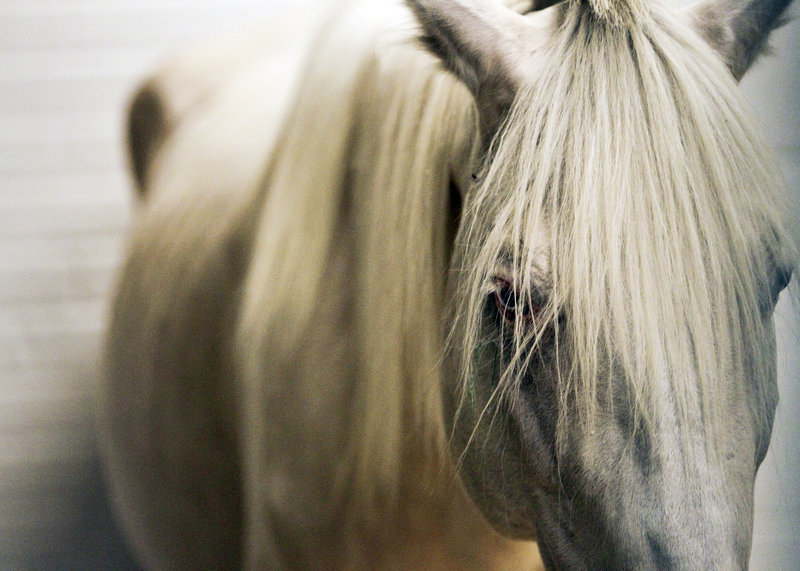MINNEAPOLIS – The three horses’ ribs, hips and spines protruded through their skin. They were missing hair. A fourth horse, dead for a while, was just hide and bones.
With only hay shavings and 4 inches of drinking water, and manure packed nearly 2 feet deep on the pen floor, the animals apparently had been starving and without care for some time, according to court documents.
But this episode, in Swift County, was different from others involving an estimated 600 Minnesota horses that an investigator says have starved to death or been slaughtered over the past four years.
Three members of an Appleton, Minn., family were each charged with a felony for cruelty to animals this summer, the first felony charges ever in Minnesota for the alleged starving of horses, authorities say. Joann Dokken, 60, Leroy Dokken, 63, and their son, Michael Dokken, 36, face up to two years in jail and $5,000 fines, if convicted.
“The Dokken case could be a landmark case,” said Dr. Kathleen Jost, the Benson, Minn., veterinarian who helped investigate the western Minnesota animal abuse case.
An omnibus hearing in their case, which had been scheduled for last week, has been moved to Dec. 13. Neil Tangen of Glenwood, one of three public defenders for the Dokkens, declined to comment on the case.
“I realize that horses die, and I understand the changing economics and changing rural demographics,” Jost said of animals that the Minnesota Legislature last year classified as livestock, as opposed to domestic animals. “But it’s about time that somebody stood up for these defenseless animals.”
From Minneapolis-St. Paul to the northeastern Minnesota town of Tower, where four horses were found dead on a dilapidated farm in March, horses have fallen victim to hard times. Hay and fuel prices are up, interest in 4-H activities is diminishing and the role of the horse in plowing fields is gone forever.
While horse neglect usually runs in cycles dependent on economics, University of Minnesota veterinarian Dr. Krishona Martinson says, this is the first period she can recall in which 300 to 400 Minnesota horses have been found malnourished for several years in a row, with no respite on the horizon.
“You can sell off beef, dairy or swine, but not horses,” Martinson said, noting that the federal government stopped funding USDA inspectors for horse-slaughter facilities, essentially banning horse meat from being processed in the United States since 2009.
“The extreme drought in Texas has forced a spike in hay prices,” Martinson said. “Unlike five years ago, there are more unwanted horses than ever. It’s devastating.”
In July, Leann Hanson, 43, of Starbuck, Minn., was sentenced to two years’ probation and fined $500 after Pope County sheriff’s deputies and Animal Humane Society officials found seven dead horses and 14 others severely emaciated and dehydrated on her property.
In late August, 10 emaciated horses were seized by the Humane Society from Lowell Friday’s farm in East Bethel. Friday, who pleaded guilty to animal neglect in 2007, has not been charged to date in this instance.
Last month, eight starving horses and two mules were seized from a farm near Litchfield, after neighbors complained of seeing a dead horse that had not been buried, said Bobbie Bauman, of the Animal Humane Society of Meeker and Kandiyohi counties. No charges have been filed in that case.
“Was the state trying to make an example out of me?” Hanson asked, noting that penalties for animal abuse seem to vary, from county to county.
She was charged with eight misdemeanors and pleaded guilty to four in a settlement.
“My horses were my babies, and now I can’t have horses on my property for two years. I should have had a veterinarian come out, but that costs hundreds of dollars. And I learned: Don’t ever let ’em on your property unless they have a search warrant.”
It costs up to $4,000 a year to maintain a horse, said Keith Streff, chief investigator for the Animal Humane Society. For many economically challenged horse owners, caring for an elderly horse “is like being saddled with a 1,000-pound feral cat,” said Streff, who investigated the Dokken and Hanson horse pens.
“There’s been a significant spike in horse-related crimes that have been reported the last two years,” Streff said. “People are no longer willing to tolerate it.”
Send questions/comments to the editors.



Success. Please wait for the page to reload. If the page does not reload within 5 seconds, please refresh the page.
Enter your email and password to access comments.
Hi, to comment on stories you must . This profile is in addition to your subscription and website login.
Already have a commenting profile? .
Invalid username/password.
Please check your email to confirm and complete your registration.
Only subscribers are eligible to post comments. Please subscribe or login first for digital access. Here’s why.
Use the form below to reset your password. When you've submitted your account email, we will send an email with a reset code.